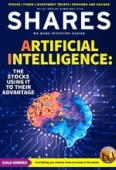Archived article
Please note that tax, investment, pension and ISA rules can change and the information and any views contained in this article may now be inaccurate.
Proof that boring companies can make the best investments

Imagine you’ve been given the choice of investing in three companies. You can choose one of two batches with the intention of holding them for at least five years.
The first batch features a rat catcher, a provider of emergency telephones for lifts and a trucking company carrying small loads across the US. Sounds boring, right?
The second batch features an American cruise line operator. You also get the owner of brands loved by young and old including Yankee Candle and Sharpie pens, and a fashion seller which generated $6.2 billion revenue in 2022.
I would wager that more people would choose the second trio of stocks over the first batch. They all sound exciting – many are likely to have used their products and services, and that familiarity means investors might feel more comfortable owning a slice of these businesses.
Unfortunately, if you had picked batch two a decade ago, you would be holding a trio of duds. Each one of these three companies has lost money for investors over that period.
The leisure group is Norwegian Cruise Line (NCLH:NYSE), which has delivered a 7.5% negative annualised total return (share price gains/losses and dividends) on a 10-year basis, according to SharePad data. The Sharpie owner is Newell Brands (NWL:NASDAQ) which would have lost you 4.7% a year over that decade-long period and the fashion group is Ralph Lauren (RL:NYSE) with 3.3% negative annualised return.
In contrast, batch one features the winners. On a 10-year view, the trucking company is Old Dominion Freight Line (ODFL:NASDAQ) which has achieved 27.4% annualised total return. The rat catcher is Rentokil (RTO) with a 22% annual gain and the emergency phone group is Halma (HLMA), which boasts a 17.5% annual gain.
This is the perfect illustration that boring is beautiful when it comes to investing. While the three ‘winners’ all trade on premium valuations, that is a recognition of the strong returns they’ve generated over the years.
Think of some of the other boring names to have made investors rich over the years, such as Bunzl (BNZL) which supplies things that companies need to do business but do not actually sell to customers – think takeaway cups for coffee shops or clean door mats for hotels and offices.
Too many investors automatically flock to companies with a good narrative, thinking that is the ticket to easy returns. Space as an investing theme is a good example. We’re all fascinated by the opportunities with space, but how many of the relevant companies make any money? As a bellwether for the sector, note that Seraphim Space Investment Trust (SSIT) is down 60% in value since it joined the stock market in 2021.
Often it can pay to put your money into something more mundane, whether that’s companies which fix blocked drains or make widgets to keep factories running.
Exchange-traded fund providers have been scrambling over themselves to launch thematic ETFs which track hot themes. But they’re missing a trick.
I’d be the first in line to buy a ‘boring companies’ ETF, yet such a product still doesn’t exist. Sadly, the ETF industry would no doubt argue it would be too hard to market. What a shame.
Important information:
These articles are provided by Shares magazine which is published by AJ Bell Media, a part of AJ Bell. Shares is not written by AJ Bell.
Shares is provided for your general information and use and is not a personal recommendation to invest. It is not intended to be relied upon by you in making or not making any investment decisions. The investments referred to in these articles will not be suitable for all investors. If in doubt please seek appropriate independent financial advice.
Investors acting on the information in these articles do so at their own risk and AJ Bell Media and its staff do not accept liability for losses suffered by investors as a result of their investment decisions.
Issue contents
Danni Hewson
Feature
- Artificial intelligence: the stocks using it to their advantage
- Discover how these two technical indicators can make you money and two shares to buy now
- Emerging markets: earnings season, resource nationalism and a tale of two sectors
- Are emerging markets less reliant on commodities than you think?
- The fast-food stocks making investors rich: the secrets of their success
- Should I worry if my investments aren’t making money?
Great Ideas
News
- Initial surge as Zoom beats expectations and lifts forecasts fails to last
- ATOME shares boosted by Baker Hughes investment and its fertiliser plan
- Germany’s flagship DAX index surges to new all-time high
- The owner of Boots loses a quarter of its value in six months
- Sage seizes its chance to impress investors
- Stealth rally in construction stocks suggests economy is on a firm footing
 magazine
magazine








